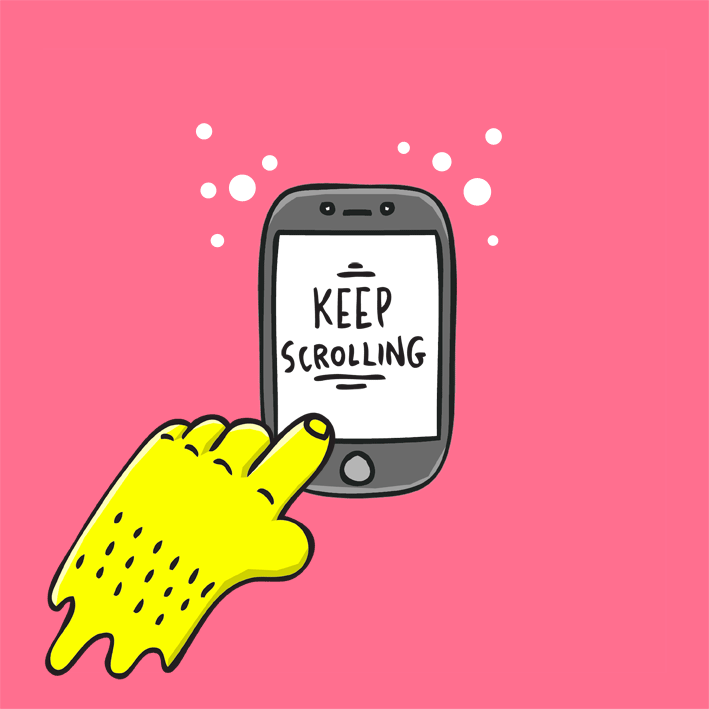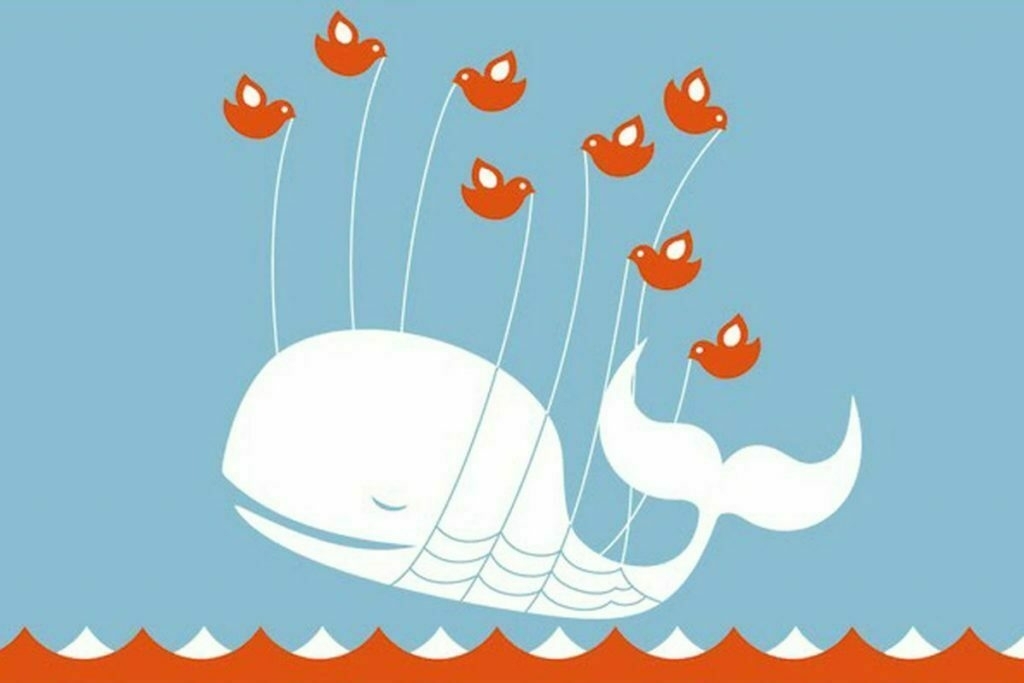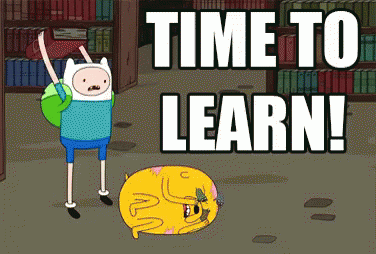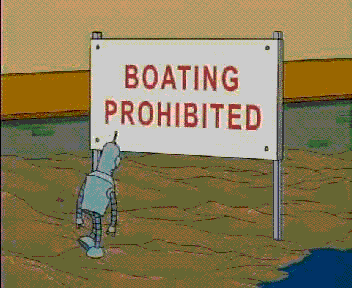- People seem not to see that their opinion of the world is also a confession of character
- We have it in our power to begin the world over again
- There is no creature whose inward being is so strong that it is not greatly determined by what lies outside it
- Tips for aspiring Mountain Leaders (@CraigTaylor74)
- Decentralised learning (@plaao)
- Slippers and sandals (@boyledsweetie)
- Carbon footprint of blockchain-based credentials (@ConcentricSky)
- How educators can promote their good practices without looking like they're bragging (@pullel)
- Why the last episode of Game of Thrones was so very bad (@MikeySwales)
- Be flexible with your planned route, especially in respect to the weather
- Don't buy super-expensive gear until you actually need it
- Write down your learning experiences the same day as you experience them
- Go walking with different people (although not with anyone who's got their ML, if you want it to count towards your QMDs!)
- Do buy walking poles and gaiters, even if you feel a prat using them
- Keep showing up in the same spaces every day/week so that people know where to find you (online/offline)
- Share your work without caring about recognition
- Point to other people and both recognise and celebrate their contributions
- Economic freedom. We must let everyone meet their basic needs without being forced into the Job Loop. With economic freedom, we can embrace automation and enable everyone to participate in and benefit from the Digital Knowledge Loop.
- Informational freedom. We must remove barriers from the Digital Knowledge Loop that artificially limit learning from existing knowledge, creating new knowledge based on what we learn and sharing this new knowledge. At the same time must build systems that support the operation of critical inquiry in the Digital Knowledge Loop.
- Psychological freedom. We must free ourselves from scarcity thinking and its associated fears and other emotional reactions that impede our participation in the Digital Knowledge Loop. Much of the peril of the Digital Knowledge Loop arises directly from a lack of psychological freedom.
Modular learning and credentialing
I’ve got far more to say about this than the space I’ve got here on Thought Shrapnel. This article from edX is in the emerging paradigm exemplified by initiatives such as Credential As You Go, which encourages academic institutions to issue smaller credentials or badges as the larger qualification progresses.
That’s one, important, side of the reason I got involved in Open Badges. It allows, for example, someone who couldn’t finish their studies to continue them, or to cash in what they’ve already learned in the job market.
But there’s an important other side to this, which is democratising the means of credentialing, so that it’s no longer just incumbents who issue badges and credentials. I feel like that’s what we’re working on with Open Recognition.

A new model, modular education, reduces the cycle time of learning, partitioning traditional learning packages — associate’s, bachelor’s, and master’s degrees — into smaller, Lego-like building blocks, each with their own credentials and skills outcomes. Higher education institutions are using massive open online courses (MOOCs) as one of the vehicles through which to deliver these modular degrees and credentials.Source: Stackable, Modular Learning: Education Built for the Future of Work | edX[…]
Modular education reduces the cycle time of learning, making it easier to gain tangible skills and value faster than a full traditional degree. Working professionals can learn new skills in shorter amounts of time, even while they work, and those seeking a degree can do so in a way that pays off, in skills and credentials, along the way rather than just at the end.
For example, edX’s MicroBachelors® programs are the only path to a bachelor’s degree that make you job ready today and credentialed along the way. You can start with the content that matters most to you, online at your own pace, and earn a certificate with each one to show off your new achievement, knowing that you’ve developed skills that companies actually hire for. Each program comes with real, transferable college credit from one of edX’s university credit partners, which combined with previous credit you may have already collected or plan to get in the future, can put you on a path to earning a full bachelor’s degree.
Handwriting, note-taking, and recall
I write by hand every day, but not much. While I used to keep a diary in which I’d write several pages, I now keep one that encourages a tweet-sized reflection on the past 24 hours. Other than that, it’s mostly touch-typing on my laptop or desktop computer.
Next month, I’ll start studying for my MSc and the university have already shipped me the books that form a core part of my study. I’ll be underlining and taking notes on them, which is interesting because I usually highlight things on my ereader.
This article in The Economist is primarily about note-taking and the use of handwriting. I think it’s probably beyond doubt that for deeper learning and recall this is more effective. But perhaps for the work I do, which is more synthesis of multiple sources, I find digital more practical.

A line of research shows the benefits of an “innovation” that predates computers: handwriting. Studies have found that writing on paper can improve everything from recalling a random series of words to imparting a better conceptual grasp of complicated ideas.Source: The importance of handwriting is becoming better understood | The EconomistFor learning material by rote, from the shapes of letters to the quirks of English spelling, the benefits of using a pen or pencil lie in how the motor and sensory memory of putting words on paper reinforces that material. The arrangement of squiggles on a page feeds into visual memory: people might remember a word they wrote down in French class as being at the bottom-left on a page, par exemple.
One of the best-demonstrated advantages of writing by hand seems to be in superior note-taking. In a study from 2014 by Pam Mueller and Danny Oppenheimer, students typing wrote down almost twice as many words and more passages verbatim from lectures, suggesting they were not understanding so much as rapidly copying the material.
[…]
Many studies have confirmed handwriting’s benefits, and policymakers have taken note. Though America’s “Common Core” curriculum from 2010 does not require handwriting instruction past first grade (roughly age six), about half the states since then have mandated more teaching of it, thanks to campaigning by researchers and handwriting supporters. In Sweden there is a push for more handwriting and printed books and fewer devices. England’s national curriculum already prescribes teaching the rudiments of cursive by age seven.
Intelligent failure
Andrew Curry links to Amy Edmondsen’s new book about ‘intelligent failure’. She’s also got a recorded talk from the RSA on the same topic which I’ve queued up to watch.
Although some people who have sat through teacher in-service training days may beg to differ, there’s no such thing as wasted learning. It’s all grist to the inspiration mill, and I’m always surprised at how often insights are generated between unexpected overlaps.
This, though, isn’t about serendipity, but rather about goal-directed behaviours to reach an outcome. Which pre-supposes, of course, that we’re working towards a goal. In these times of rolling catastrophe, it’s worth remembering that having goals is something that used to be normal.
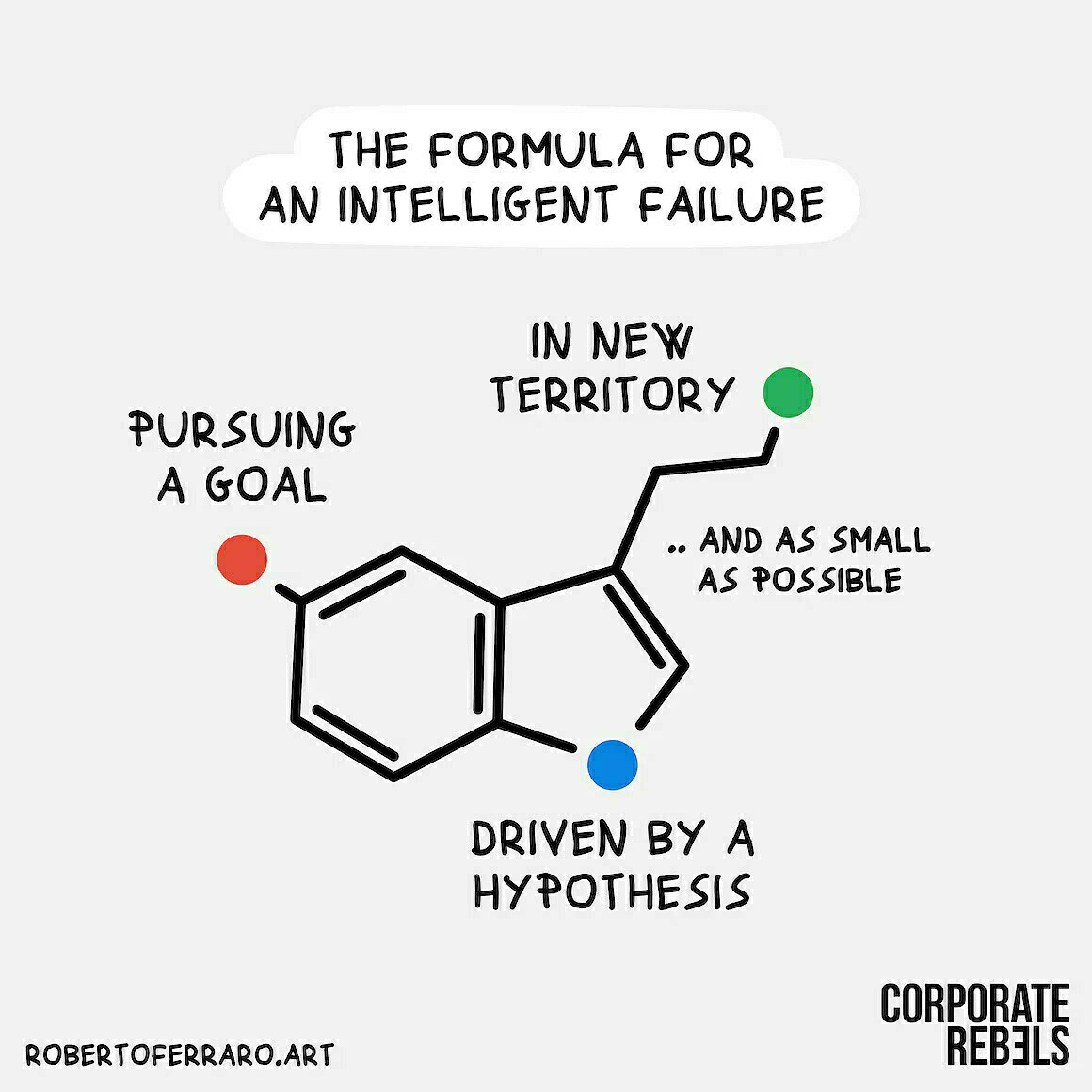
We are all taught these days that failure is an essential part of learning, and that we need to fail if we want to develop as people. But it’s one thing to hear that, and another thing to be able to do it. Because we have all grown up in education systems where failure is bad, and worked for organisations where failure gets punished in a whole range of less-then-explicit ways.Source: Energy | Failing - by Andrew CurrySo it is interesting to see Amy Edmondsen writing about “intelligent failure” on the Corporate Rebels blog. She has just published a book on this theme.
[…]
The first part of this is to know that there are different kinds of failures. The set of things that are included in “intelligent failures” does not include failures that happened because you couldn’t be bothered. But it does include failures that happen as a result of complexity or bad luck.
So by working hard to prevent avoidable failures, they are able to embrace the other ones.
Edmondsen has developed a model from her research about intelligent failure which the Corporate Rebels turned into one of their distinctive graphics. Here are her four criteria:
It (1) takes place in new territory (2) in pursuit of a goal, (3) driven by a hypothesis, and (4) is as small as possible. Because they bring valuable new information that could not have gained in any other way, intelligent failures are praiseworthy indeed.
Virtual spaces for learning and collaboration
Today, I’ve been doing a UCL short course. As we were coming back from a break, we were discussing the lack of ‘embodiedness’ in virtual interactions. This reminded me of experiments with different platforms that WAO did during the pandemic.
This post by Alja from Tethix is prompted by a challenge-based learning platform that I took part in last year. They’re focusing on tech ethics (hence the name) and their approach was great. It was just that the tools got in the way to some extent.
I think, after reading this, it’s time to experiment again with some of the tools mentioned in the post. Sometimes you do need a sense of play and feel like you’re connected in ways that go beyond small boxes on a screen.
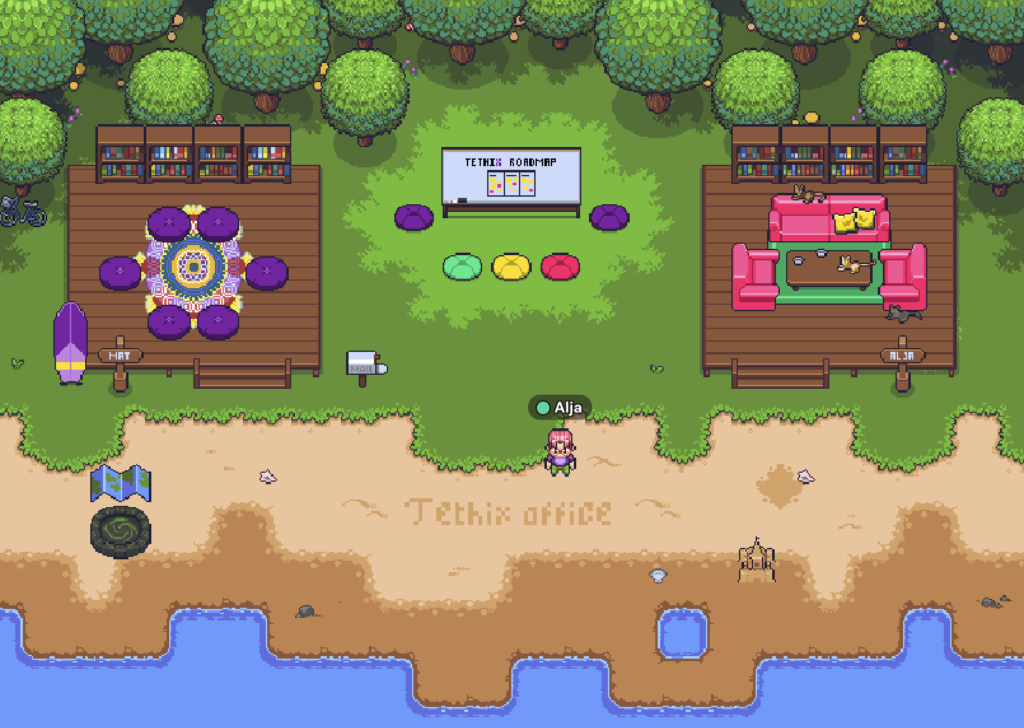
The Tethix Archipelago emerged from the Challenge Based Learning pilot we did in March last year. For the pilot, we designed a unique collaborative online learning experience in tech ethics and used Mural collaborative whiteboards and visual storytelling to situate the learning journey in a fictional world: the Tethix Archipelago. The Archipelago consists of four islands that emerged from the four essentials skills of the Challenge Based Learning journey: collaboration, exploration, practice, and reflection.Source: Welcome to the Tethix Archipelago | TethixMural turned out to be a great tool for collaboration and live session guidance, but it didn’t really convey a sense of place. Clicking on a link in a Mural to visit the next leg of your journey just doesn’t feel like traveling, especially when you’re trapped in the same little Zoom box during every live session.
So we started exploring tools that could help us convey a sense of space and discovered Gather and WorkAdventure, among others. These tools offer two-dimensional virtual collaborative spaces where you can walk around a space with your avatar and have proximity-based conversations by using your microphone and camera.
[…]
You might be thinking: this is cute and all, but is this Archipelago all games and play? Well, playfulness is a big part of why we’re experimenting with these game-like worlds; we know that play helps us learn better and can unlock our imagination. But there’s much more to it than just millennial nostalgia for pixel graphics.
As already mentioned, Gather allows us to build a sense of place, both inside rooms and between them. And a sense of place helps with learning and memory encoding. Historical records show ancient Greeks using the method of loci or memory palaces, a technique for improving memory encoding and retrieval, and humans have been developing other mnemonic techniques based on spatial relationship for much longer than that. We’re physical beings, uniquely equipped to understand space, whether physical or represented by pixels.
AI everywhere in education
Jon Dron makes a good point here that we need to put the humanity back into education, otherwise we’re going to have AI everywhere and a completely broken system.
I thought it would be fun, in an ironic kind of way, to use an AI art generator to illustrate this post…
To a significant extent, we already have artificial students, and artificial teachers teaching them. How ridiculous is that? How broken is the system that not only allows it but actively promotes it?Source: So, this is a thing… | Jon Dron[…]
This is a wake-up call. Soon, if not already, most of the training data for the AIs will be generated by AIs. Unchecked, the result is going to be a set of ever-worse copies of copies, that become what the next generation consumes and learns from, in a vicious spiral that leaves us at best stagnant, at worst something akin to the Eloi in H.G. Wells’s Time Machine. If we don’t want this to happen then it is time for educators to reclaim, to celebrate, and (perhaps a little) to reinvent our humanity. We need, more and more, to think of education as a process of learning to be, not of learning to do, except insofar as the doing contributes to our being. It’s about people, learning to be people, in the presence of and through interaction with other people. It’s about creativity, compassion, and meaning, not the achievement of outcomes a machine could replicate with ease. I think it should always have been this way.
Image: DALL-E 2 (“robot painting a picture of a robot painting a picture of a robot, in the style of Rene Magritte”)
Unless one is a genius, it is best to aim at being intelligible

👯♀️ Secrets of the VIP Party: Why the 1% Love ‘Ritualised Waste’ — "Post-pandemic, in a broader sense, you glimpsed an immediate reckoning and disgust with ostentatious displays of wealth in the context of COVID-19. We saw some instances where people would make statements like ‘we’re all in this together’, while broadcasting from their luxury yacht or private island, followed by a backlash. I think they’ve quickly learned not to do that since…"
This is an incredible read: an interview with a former model turned sociology professor.
💳 Germany To Let Citizens Store ID Cards On Smartphone — "The Interior Ministry said Wednesday that from this fall, citizens will be able to use the electronic ID stored in their smartphones together with a PIN number to prove they are who they claim to be when communicating with authorities or private businesses."
It's Germany, so I'm sure they'll do this sensibly, but it's incredible to think how quickly smartphones have become an essential part of our everyday life.
🏛️ 'A very dangerous epoch': historians try to make sense of Covid — "It is not just the Covid pandemic that can make these feel like unusually significant times. Populism, Trump’s rise and (perhaps) fall, Brexit, the Black Lives Matter and #MeToo protests, mass movement of refugees, the increased might of both China and India and many other issues have contributed to a sense of humanity having reached a historic moment, all while the climate crisis rages with ever more urgency."
People always think they're living through unprecedented times. But in our case, we probably are.
🚸 Why there's no such thing as lost learning — "The fact is that we – as a community of politicians, teachers and education experts – decide what any child must know, understand or be able to do at each age, not some natural law of learning. Why should a child know the structure of a cell membrane by the age of 16? I couldn’t know that information at 16 because it had not yet been fully discovered and described. But I learned it at a later stage."
This is a useful post to point people towards, as the author does a great job of pointing out the ridiculousness of putting an arbitrary body of knowledge before the well-being of young people.
👑 Should Elizabeth II be Elizabeth the Last? At least allow Britain a debate — "But none of [these revelations] reflect the real damage the monarchy inflicts on us. It’s not their money nor their abuse of power, but their very existence that ambushes and infantilises the public imagination, making us their subjects in mind and spirit."
My views on privilege hardly need rehearsing here, but suffice to say that one of the main problems with our tiny island is the delusions of grandeur we have through outdated institutions such as the monarchy.
Quotation-as-title by Anthony Hope. Image by Tyler Nix.
Like the flight of a sparrow through a lighted hall, from darkness into darkness

⚽ Is it too late to halt football’s final descent into a dystopian digital circus?
🎧 Why Music is Helpful for Concentration
😬 I Lived Through Collapse. America Is Already There.
😷 COVID-19 map for schools (UK)
Quotation-as-title from St Bede. Image from top-linked post.
The old is dying and the new cannot be born
Education for a post-pandemic future
Welcome to the fourth instalment in this blog chain about post-pandemic society:
This time, I want to talk about education. It's been a decade since I left the classroom as a school teacher and senior leader but, just after doing so, I co-kickstarted a project called Purpos/ed: what's the purpose of education? While the original website has long since gone the way of all digital bits and bytes, it can still be accessed via the Internet Archive's Wayback Machine (which may take significantly longer to load than most websites, so be patient!)
There were some fantastic contributions to that project, each of which were 500 words long. We followed that up with image remixes, audio contributions, and even a one-day unconference at Sheffield Hallam university! All of the written contributions were compiled into a book that was published by Scholastic (I've still got a few copies if anyone wants one) and the campaign ended up being featured on the front page of the TES.
My reason for returning to this project is that it seems that many people, especially parents and educators, are once again thinking about the purpose of education. There is even a UNESCO Commission on the Futures of Education to which you can add your voice.
Below are some of my favourite responses to the Purpos/ed campaign, right after a video clip from Prof. Keri Facer, whose work (especially Learning Futures) served as our inspiration.
Before the first Purpos/ed post was written, I jotted down my own off-the-cuff answer: "the purpose of education is to aid our meditation on purposes — what should we do, why and how?". I know that's a bit glib, but it adds a reflexive twist to this debate: how sophisticated and sensitive to changing context are our education systems and discourse? I worry we may be in for a rude awakening when the education squabbles of the Easy Times are shown up as an irrelevant sideshow when the Hard Times bite.
David Jennings
Education should not be just be about the ‘system’ or the schools, it should be about the community and drawing on the skills and knowledge that is within our local communities. Enabling our children to learn from what has gone before to ensure that they enhance their own future. For many education provides an escape, a way out that broadens their horizons and provides them with opportunities that they did not realize existed, that can ultimately provide them with richness and most importantly happiness.
Dawn Hallybone
The internet provides us with rich and free spaces for expansive learning. The institutions only have left their monopoly on funding and on certification. And so capitalism has begun a new project. The first aim is to strike out at democratization of learning by privatizing education, by deepening barriers to equality and access. And the second more audacious aim is to privatize knowledge itself, to turn knowledge and learning into a commodity to be bought and sold like any other consumer good.
Thus we find ourselves at a turning point for the future of education. The contradictions inherent in the different views of the purpose of education do not allow any simple compromise or reform minded tinkering with the system. For those that believe in education as the practice of freedom there are two challenges: to develop a societal discourse around the purpose of education and secondly to develop transformative practice, as teacher students and student teachers.
Graham Attwell
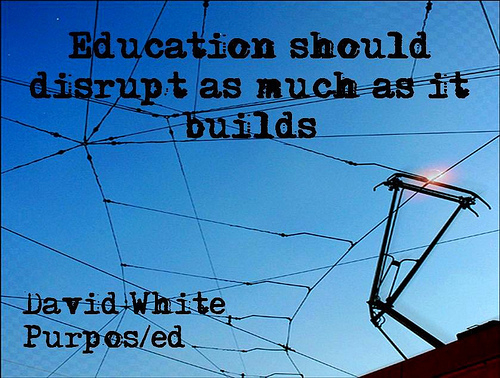
Education should critically ensure children, young people and adults are equipped to be unsettled, to be confronted by difference, to be changed, and to effect change. Education is a conduit to different cultures, different places, different times - to different ways of thinking about things and doing things. Education provides us with an introduction to things unimagined and unencountered. It should provide the critical challenge to examine our beliefs, interpretations and horizons, the ability to reexamining ourselves in new contexts, to develop new interests, to review the ways in which we understand ourselves and our place in the world. The purpose of education should be to expand expectations, not to confine them - to support our learners in understanding the impact they can and do have on their world. We cannot expect education built upon, and educators who model, a fixation with certainty and inflexibility to meet the urgent and ongoing needs of pressing social, economic and political change.
Josie Fraser
For me, the purpose of education is to become a better human being; recognising that we share a commonality with others around us and that we are bound to the ones who walked before and the ones to come. It allows us to draw on the experiences of the past and help prepare us to face the future (with all its attendant opportunities and issues). Conceived in this sense, it allows us to remove the primacy of the veneer (worker, teacher, student, friend) and reinstates these (important) roles within the context that they form part of a larger whole. Doing so would also allow us to rethink the relationship of means and ends and unlock the powerful impact this reconfiguration can have for the lives of people around us when we do treat them as they should be.
Nick Dennis
The desire to learn is woven into the concept of contentment and that, for me at least, is the basic purpose of any education system. Contentment can flourish into happiness, riches, recognition or any other myriad of emotional and material gain. But without a content society, with an ambition to continually discover and question the world around them throughout life, we end up with society's biggest enemies: complacency, stagnancy, apathy and ambivalence.
Ewan mcintosh
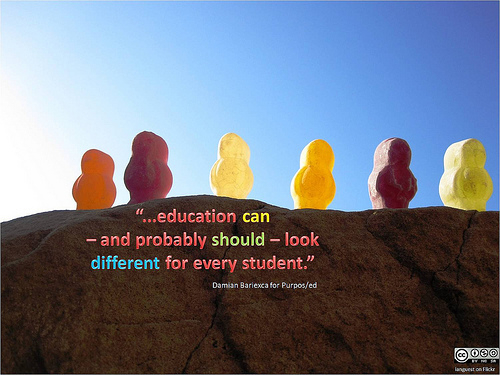
An educated population is probably the least governable, the most likely to rebel, the most stubborn and the most critical. But it is a population capable of the most extraordinary things, because each person strides purposefully forward, and of their own volition, together, they seek a common destiny.
Stephen Downes
Education, it seems, is the method by which we attempt to make the world come out the way we want it to. It is about using our power to shape and control the world to come so that it comes into line with our own hopes and dreams. In any way we move it, even towards chaos and anarchy, we are still using our power to shape and control the future.
Dave Cormier
It is make or break time for humanity and we have a responsibility to draw a line in the sand, admit our mistakes and create a system of education that can begin to undo the harm that we have done to the world. For all the talk over the last twenty years of the ‘global village’, it has not stopped us continuing to destroy our planet, to wage wars and to continue to ignore the inequalities in society. What is the purpose of education? Surely, it is to create unity by helping future generation to recognise the values that humanity share.
James mIchie
As Purpos/ed was a non-partisan campaign, Andy Stewart and I didn't give our views on the purpose of education. But perhaps, in a follow-up post, it's time to explicitly state what, for me, it's all about? I'd certainly like to read what others are thinking...
Quotation-as-title from Antonio Gramsci. Header image via Pixabay.
Friday fashionings
When sitting down to put together this week's round-up, which is coming to you slightly later than usual because of <gestures indeterminately> all this, I decided that I'd only focus on things that are positive; things that might either raise a smile or make you think "oh, interesting!"
Let me know if I've succeeded in the comments below, via Twitter, Mastodon, or via email!
Digital Efficiency: the appeal of the minimalist home screen
The real advantage of going with a launcher like this instead of a more traditional one is simple: distraction reduction and productivity increases. Everything done while using this kind of setup is deliberate. There is no scrolling through pages upon pages of apps. There is no scrolling through Google Discover with story after story that you will probably never read. Instead between 3–7 app shortcuts are present, quick links to clock and calendar, and not much else. This setup requires you as the user to do an inventory of what apps you use the most. It really requires the user to rethink how they use their phone and what apps are the priority.
Omar Zahran (UX Collective)
A year ago, I wrote a post entitled Change your launcher, change your life about minimalist Android launchers. I'm now using the Before Launcher, because of the way you can easily and without any fuss customise notifications. Thanks to Ian O'Byrne for the heads-up in the We Are Open Slack channel.
It's Time for Shoulder Stretches
Cow face pose is the yoga name for that stretch where one hand reaches down your back, and the other hand reaches up. (There’s a corresponding thing you do with your legs, but forget it for now—we’re focusing on shoulders today.) If you can’t reach your hands together, it feels like a challenging or maybe impossible pose.
Lifehacker UK
I was pretty shocked that I couldn't barely do this with my right hand at the top and my left at the bottom. I was very shocked that I got nowhere near the other way around. It just goes to show that those people who work at home really need to work on back muscles and flexibility.
Dr. Seuss’s Fox in Socks Rapped Over Dr. Dre’s Beats
As someone who a) thinks Dr. Dre was an amazing producer, and b) read Dr. Seuss’s Fox in Socks to his children roughly 1 million times (enough to be able to, eventually, get through the entire book at a comically high rate of speed w/o any tongue twisting slip-ups), I thought Wes Tank’s video of himself rapping Fox in Socks over Dre’s beats was really fun and surprisingly well done.
Jason Kottke
One of the highlights of my kids being a bit younger than they are now was to read Dr. Suess to them. Fox in Socks was my absolute tongue-twisting favourite! So this blew me away, and then when I went through to YouTube, the algorithm recommended Daniel Radcliffe (the Harry Potter star) rapping Blackalicious' Alphabet Aerobics. Whoah.

Google launches free version of Stadia with a two-month Pro trial
Google is launching the free version of its Stadia game streaming service today. Anyone with a Gmail address can sign up, and Google is even providing a free two-month trial of Stadia Pro as part of the launch. It comes just two months after Google promised a free tier was imminent, and it will mean anyone can get access to nine titles, including GRID, Destiny 2: The Collection, and Thumper, free of charge.
Tom Warren (The Verge)
This is exactly the news I've been waiting for! Excellent.
Now is a great time to make some mediocre art
Practicing simple creative acts on a regular basis can give you a psychological boost, according to a 2016 study in the Journal of Positive Psychology. A 2010 review of more than 100 studies of art’s impact on health revealed that pursuits like music, writing, dance, painting, pottery, drawing, and photography improved medical outcomes, mental health, social networks, and positive identity. It was published in the American Journal of Public Health.
Gwen Moran (Fast Company)
I love all of the artists on Twitter and Instagram giving people daily challenges. My family have been following along with some of them!
What do we hear when we dream?
[R]esearchers at Norway's Vestre Viken Hospital Trust and the University of Bergen conducted a small study to quantify the auditory experience of dreamers. Why? Because they wanted to "assess the relevance of dreaming as a model for psychosis." Throughout history, they write, psychologists have considered dreamstates to be a model for psychosis, yet people experiencing psychosis usually suffer from auditory hallucinations far more than visual ones. Basically, what the researchers determined is that the reason so little is known about auditory sensations while dreaming is because, well, nobody asks what people's dreams sound like.
David Pescovitz (Boing boing)
This makes sense, if you think about it. The advice for doing online video is always that you get the audio right first. It would seem that it's the same for dreaming: that we pay attention more to what we 'hear' than what we 'see'.

How boredom can inspire adventure
Humans can’t stand being bored. Studies show we’ll do just about anything to avoid it, from compulsive smartphone scrolling right up to giving ourselves electric shocks. And as emotions go, boredom is incredibly good at parting us from our money – we’ll even try to buy our way out of the feeling with distractions like impulse shopping.
Erin Craig (BBC Travel)
The story in this article about a prisoner of war who dreamed up a daring escape is incredible, but does make the point that dreaming big when you're locked down is a grat idea.
But what could you learn instead?
“What did you learn today,” is a fine question to ask. Particularly right this minute, when we have more time and less peace of mind than is usually the norm.
It’s way easier to get someone to watch–a YouTube comic, a Netflix show, a movie–than it is to encourage them to do something. But it’s the doing that allows us to become our best selves, and it’s the doing that creates our future.
It turns out that learning isn’t in nearly as much demand as it could be. Our culture and our systems don’t push us to learn. They push us to conform and to consume instead.
The good news is that each of us, without permission from anyone else, can change that.
Seth Godin
A timely, inspirational post from the always readable (and listen-worthy) Seth Godin.
The Three Equations for a Happy Life, Even During a Pandemic
This column has been in the works for some time, but my hope is that launching it during the pandemic will help you leverage a contemplative mindset while you have the time to think about what matters most to you. I hope this column will enrich your life, and equip you to enrich the lives of the people you love and lead.
Arthur C. Brooks (The atlantic)
A really handy way of looking at things, and I'm hoping that further articles in the series are just as good.
Images by Kevin Burg and Jamie Beck (they're all over Giphy so I just went to the original source and used the hi-res versions)
The world is all variation and dissimilarity
Another quotation-as-title from Michel de Montaigne. I'm using it today, as I want to write a composite post based on a tweet I put out yesterday where I simply asked What shall I write about?
Note: today's update is a little different as it's immediately available on the open web, instead of being limited to supporters for seven days. It's an experiment!
Here's some responses I got to my question:
Never let it be said that I don't give the people what they want! Five short sections, based on the serious (and not-so-serious) answers I go from my Twitter followers.
1. Tips for aspiring Mountain Leaders
Well, I'm not even on the course yet (two more Quality Mountain Days to go!) but some tips I'd pass on are:
...and, of course, subscribe to The Bushcraft Padawan!
2. Decentralised learning
Decentralisation is an interesting concept, mainly because it's such an abstract concept for people to grasp. Usually, when people talk about decentralisation, they're either talking about politics or technology. Both, ultimately, are to do with power.
When it comes to learning, therefore, decentralised learning is all about empowering learners, which is often precisely the opposite of what we do in schools. We centralise instruction, and subject young people (and their teachers) to bells that control their time.
To my mind, decentralised learning is any attempt to empower learners to be more independent. That might involve them co-creating the curriculum, it might have something to do with the way we credential and/or recognise their learning. The important thing is that learning isn't something that's done to them.
3. Slippers and sandals
I'm wearing slippers right now, as I do when I'm in the house or working in my home office. I don't think you can go past Totes Isotoner, to be honest. Comfy!
Given I live in the North East of England, my opportunities to wear sandals are restricted to holidays and a few days in summer. I had a fantastic pair of Timberland sandals back in the day, but my wife finally threw them away because they were too smelly. I'm making do now with some other ones I found in the sale on Amazon, but they're actually slightly too big for me, which is annoying.
4. Carbon footprint of blockchain-based credentials
I'll start with the Bitcoin Energy Consumption Index, which gives us a couple of great charts to show the scale of the problem of using blockchains based on a proof-of-work algorithm:
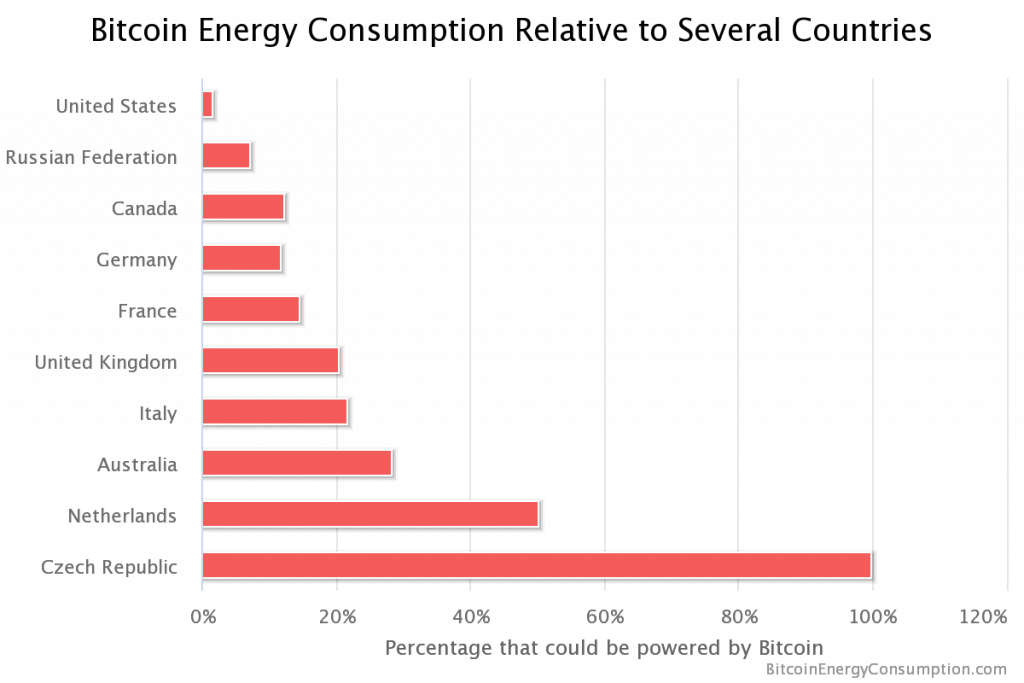
That's right, the whole of the Czech Republic could be powered by the amount of energy required to run the Bitcoin network.
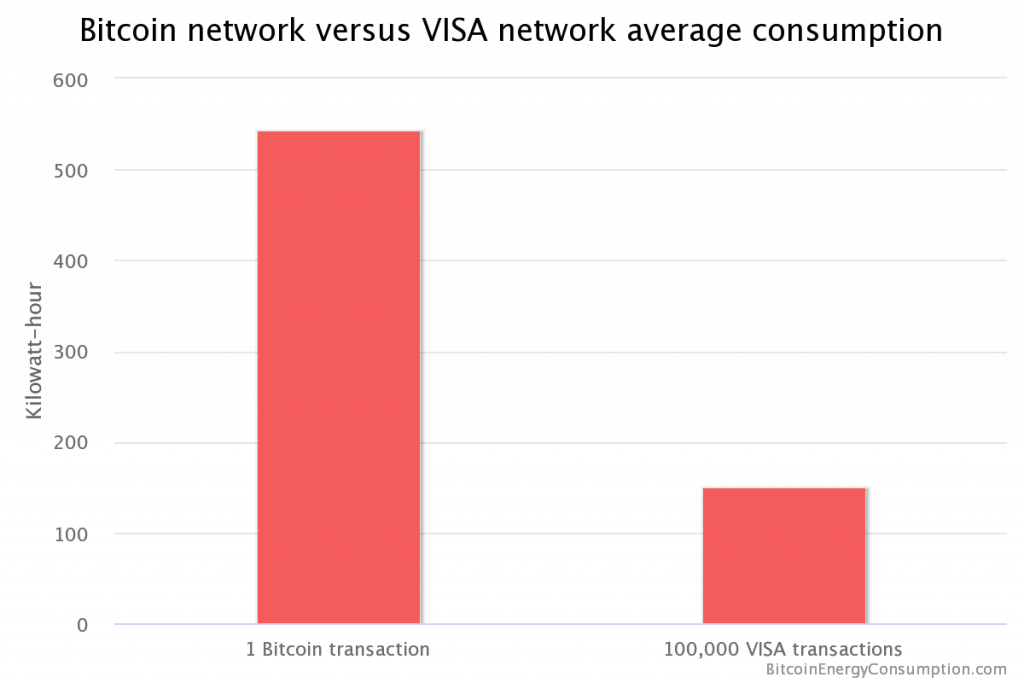
As you can see from the second chart, Bitcoin is a massive waste of energy versus our existing methods of payment. But what about other blockchain-based technologies, like Ethereum?
They've had the same problem, until recently, as Peter Fairley explains for IEEE Spectrum:
Like most cryptocurrencies, Ethereum relies on a computational competition called proof of work (PoW) . In PoW, all participants race to cryptographically secure transactions and add them to the blockchain’s globally distributed ledger. It’s a winner-takes-all contest, rewarded with newly minted cryptocoins. So the more computational firepower you have, the better your chances to profit.
[...]
Ethereum’s plan is to replace PoW with proof of stake (PoS)—an alternative mechanism for distributed consensus that was first applied to a cryptocurrency with the launch of Peercoin in 2012. Instead of millions of processors simultaneously processing the same transactions, PoS randomly picks one to do the job.
In PoS, the participants are called validators instead of miners, and the key is keeping them honest. PoS does this by requiring each validator to put up a stake—a pile of ether in Ethereum’s case—as collateral. A bigger stake earns a validator proportionately more chances at a turn, but it also means that a validator caught cheating has lots to lose.
Peter Fairley
Which brings us back to credentials. As I've said many times before, if you trust online banking and online shopping, then the Open Badges standard is secure enough for you. However, I can still see a use case for blockchain-based credentials, and wouldn't necessarily rule them out — especially if they're based on a PoS approach.
5. How educators can promote their good practices without looking like they're bragging
This is really contextual. What counts as 'bragging' in one culture and within one community won't be counted as such in another. It also depends on personality too, I guess — something we don't really talk about as educators (other than through the lens of 'character').
The only advice I can give is to do these three things:
Remember, the point is to make the world a better place, not to care who gets credit for making it better!
6. Why the last episode of Game of Thrones was so very bad
I've never even seen part of one episode, so perhaps this can help?
Do you have any questions for me to answer next time I do this?
Games (and learning) mechanics
The average age of those who play video games? Early thirties, and rising. So, I’m happy to say that purchasing Red Dead Redemption 2 is one of the best decisions I’ve made so far in 2019.
It’s an incredible, immersive game within which you could easily lose a few hours at a time. And, just like games like Fortnite, it’s being tweaked and updated after release to improve the playing experience. Particularly the online aspect.
What interests me in particular as an educator and a technologist is the way that the designers are thinking carefully about the in-game mechanics based on what players actually do. It’s easy to theorise what people might do, but what they actually do is a constant surprise to anyone who’s ever designed something they’ve asked another person to use.
Engadget mentions one update to Red Dead that particularly jumped out at me:
The update also brings a new system that highlights especially aggressive players. The more hostile you are, the more visible you will become to other players on the map with an increasingly darkening dot. Your visibility will increase in line with bad deeds such as attacking players and their horses outside of a structured mode, free roam mission or event. But, start behaving, and your visibility will fade over time. Rockstar is also introducing the ability to parlay with an entire posse, rather than individual players, which should also help to reduce how often players are killed by trolls.In other words, anti-social behaviour is being dealt with by games mechanics that make it harder for people to act inappropriately.
But my favourite update?
The update will also see the arrival of bounties. Any player that's overly aggressive and consistently breaks the law with have a bounty placed on their head, and once it's high enough NPC [Non-Playing Characters] bounty hunters will get on your tail. Another mechanism to dissuade griefing but perhaps a missed opportunity to allow players to become temporary bounty hunters and enact some sweet vengeance on the players that keep ruining their gameplay.We have a tendency in education to simply ban things we don't like. That might be excluding people from courses, or ultimately from institutions. However, when it's customers at stake, games designers have a wide range of options to influence the outcomes for the positive.
I think we’ve got a lot still to learn in education from games design.
Source: Engadget
Image by BagoGames used under a CC BY license
Games (and learning) mechanics
The average age of those who play video games? Early thirties, and rising. So, I’m happy to say that purchasing Red Dead Redemption 2 is one of the best decisions I’ve made so far in 2019.
It’s an incredible, immersive game within which you could easily lose a few hours at a time. And, just like games like Fortnite, it’s being tweaked and updated after release to improve the playing experience. Particularly the online aspect.
What interests me in particular as an educator and a technologist is the way that the designers are thinking carefully about the in-game mechanics based on what players actually do. It’s easy to theorise what people might do, but what they actually do is a constant surprise to anyone who’s ever designed something they’ve asked another person to use.
Engadget mentions one update to Red Dead that particularly jumped out at me:
The update also brings a new system that highlights especially aggressive players. The more hostile you are, the more visible you will become to other players on the map with an increasingly darkening dot. Your visibility will increase in line with bad deeds such as attacking players and their horses outside of a structured mode, free roam mission or event. But, start behaving, and your visibility will fade over time. Rockstar is also introducing the ability to parlay with an entire posse, rather than individual players, which should also help to reduce how often players are killed by trolls.In other words, anti-social behaviour is being dealt with by games mechanics that make it harder for people to act inappropriately.
But my favourite update?
The update will also see the arrival of bounties. Any player that's overly aggressive and consistently breaks the law with have a bounty placed on their head, and once it's high enough NPC [Non-Playing Characters] bounty hunters will get on your tail. Another mechanism to dissuade griefing but perhaps a missed opportunity to allow players to become temporary bounty hunters and enact some sweet vengeance on the players that keep ruining their gameplay.We have a tendency in education to simply ban things we don't like. That might be excluding people from courses, or ultimately from institutions. However, when it's customers at stake, games designers have a wide range of options to influence the outcomes for the positive.
I think we’ve got a lot still to learn in education from games design.
Source: Engadget
Image by BagoGames used under a CC BY license
Credentials and standardisation
Someone pinch me, because I must be dreaming. It’s 2018, right? So why are we still seeing this kind of article about Open Badges and digital credentials?
“We do have a little bit of a Wild West situation right now with alternative credentials,” said Alana Dunagan, a senior research fellow at the nonprofit Clayton Christensen Institute, which researches education innovation. The U.S. higher education system “doesn’t do a good job of separating the wheat from the chaff.”You'd think by now we'd realise that we have a huge opportunity to do something different here and not just replicate the existing system. Let's credential stuff that matters rather than some ridiculous notion of 'employability skills'. Open Badges and digital credentials shouldn't be just another stick to beat educational institutions.
Nor do they need to be ‘standardised’. Another person’s ‘wild west’ is another person’s landscape of huge opportunity. We not living in a world of 1950s career pathways.
“Everybody is scrambling to create microcredentials or badges,” Cheney said. “This has never been a precise marketplace, and we’re just speeding up that imprecision.”My eyes are rolling out of my head at this point. Thankfully, I’ve already written about misguided notions around ‘quality’ and ‘rigour’, as well thinking through in a bit more detail what earning a ‘credential’ actually means.Arizona State University, for example, is rapidly increasing the number of online courses in its continuing and professional education division, which confers both badges and certificates. According to staff, the division offers 200 courses and programs in a slew of categories, including art, history, education, health and law, and plans to provide more than 500 by next year.
Source: The Hechinger Report
How do people learn?
I was looking forward to digging into a new book from the US National Academies Press, which is freely downloadable in return for a (fake?) email address:
There are many reasons to be curious about the way people learn, and the past several decades have seen an explosion of research that has important implications for individual learning, schooling, workforce training, and policy.In 2000, How People Learn: Brain, Mind, Experience, and School: Expanded Edition was published and its influence has been wide and deep. The report summarized insights on the nature of learning in school-aged children; described principles for the design of effective learning environments; and provided examples of how that could be implemented in the classroom.
Since then, researchers have continued to investigate the nature of learning and have generated new findings related to the neurological processes involved in learning, individual and cultural variability related to learning, and educational technologies. In addition to expanding scientific understanding of the mechanisms of learning and how the brain adapts throughout the lifespan, there have been important discoveries about influences on learning, particularly sociocultural factors and the structure of learning environments.
How People Learn II: Learners, Contexts, and Cultures provides a much-needed update incorporating insights gained from this research over the past decade. The book expands on the foundation laid out in the 2000 report and takes an in-depth look at the constellation of influences that affect individual learning. How People Learn II will become an indispensable resource to understand learning throughout the lifespan for educators of students and adults.
Thankfully, Stephen Downes has created a slide-based overview of the key points for easier consumption!
It would have been great if he’d used different images rather than the same one on every slide, but it’s still helpful. Source: National Academies / OLDaily
Why badge endorsement is a game-changer
Since starting work with Moodle, I’ve been advocating for upgrading its Open Badges implementation to v2.0. It’s on the horizon, thankfully. The reason I’m particularly interested in this is endorsement, the value of which is explained in a post by Don Presant:
What’s so exciting about Endorsement, you may ask. Well, for one thing, it promises to resolve recurring questions about the “credibility of badges” by providing third party validation that can be formal (like accreditation) or informal (“fits our purpose”). Endorsement can also strengthen collaboration, increase portability and encourage the development of meaningful badge ecosystems.I've known Don for a number of years and have been consistently impressed by combination of idealism and pragmatism. He provides a version of Open Badge Factory in Canada called 'CanCred' and, under these auspices, is working on a project around a Humanitarian Passport.
Endorsement of organisations is now being embedded into the DNA of HPass, the international humanitarian skills recognition network now in piloting, scheduled for public launch in early 2019. Organisations who can demonstrate audited compliance with the HPass Standards for Learning or Assessment Providers will become “HPass Approved” on the system, a form of accreditation that will be signposted with Endorsement metadata baked into their badges and a distinctive visual quality mark they can display on their badge images. This is an example of a formal “accreditation-like” endorsement, but HPass badges can also be endorsed informally by peer organisations.The ultimate aim of alternative credentialing such as Open Badges is recognition, and I think that the ability to endorse badges is a big step forward towards that.
Source: Open Badge Factory
The Digital Knowledge Loop
I’ve featured the work of Albert Wenger a few times before on Thought Shrapnel. He maintains a blog called Continuations and is writing a book called World After Capital.
In this post, he expands on a point he makes in his book around the ‘Digital Feedback Loop’ which, Wenger says, has three components:
Wenger is a venture capitalist, albeit a seemingly-enlightened one. Interestingly, he's approaching the post-scarcity world through the lens of knowledge, economics, and society. As educators, I think we need to be thinking about similar things.
In fact, this reminds me of some work Martin Weller at the Open University has done around a pedagogy of abundance. After reviewing the effect of the ‘abundance’ model in the digital marketplace, looks at what that means for education. He concludes:
The issue for educators is twofold I would suggest: firstly how can they best take advantage of abundance in their own teaching practice, and secondly how do we best equip learners to make use of it? It is this second challenge that is perhaps the most significant. There is often consideration given to transferable or key skills in education (eg Dearing 1997), but these have not been revisited to take into account the significant change that abundant and free content offers to learners... Coping with abundance then is a key issue for higher education, and one which as yet, it has not made explicit steps to meet, but as with many industries, adopting a response which attempts to reinstate scarcity would seem to be a doomed enterprise.Yesterday, during a break in our MoodleNet workshop with Outlandish, we were talking about the The Up Series of documentaries that showed just how much of a conveyer belt there is for children born into British society. I think part of the problem around that is we're locked into outdated models, as Wenger and Weller point out in their respective work.
My children, for example, with a few minor updates, are experiencing the very same state education I received a quarter of a century ago. The world has moved on, yet the mindset of scarcity remains. They’re not going to have a job for life. They don’t need to selfishly hold onto their ‘intellectual property’. And they certainly don’t need to learn how to sit still within a behaviourist classroom.
Source: Continuations




